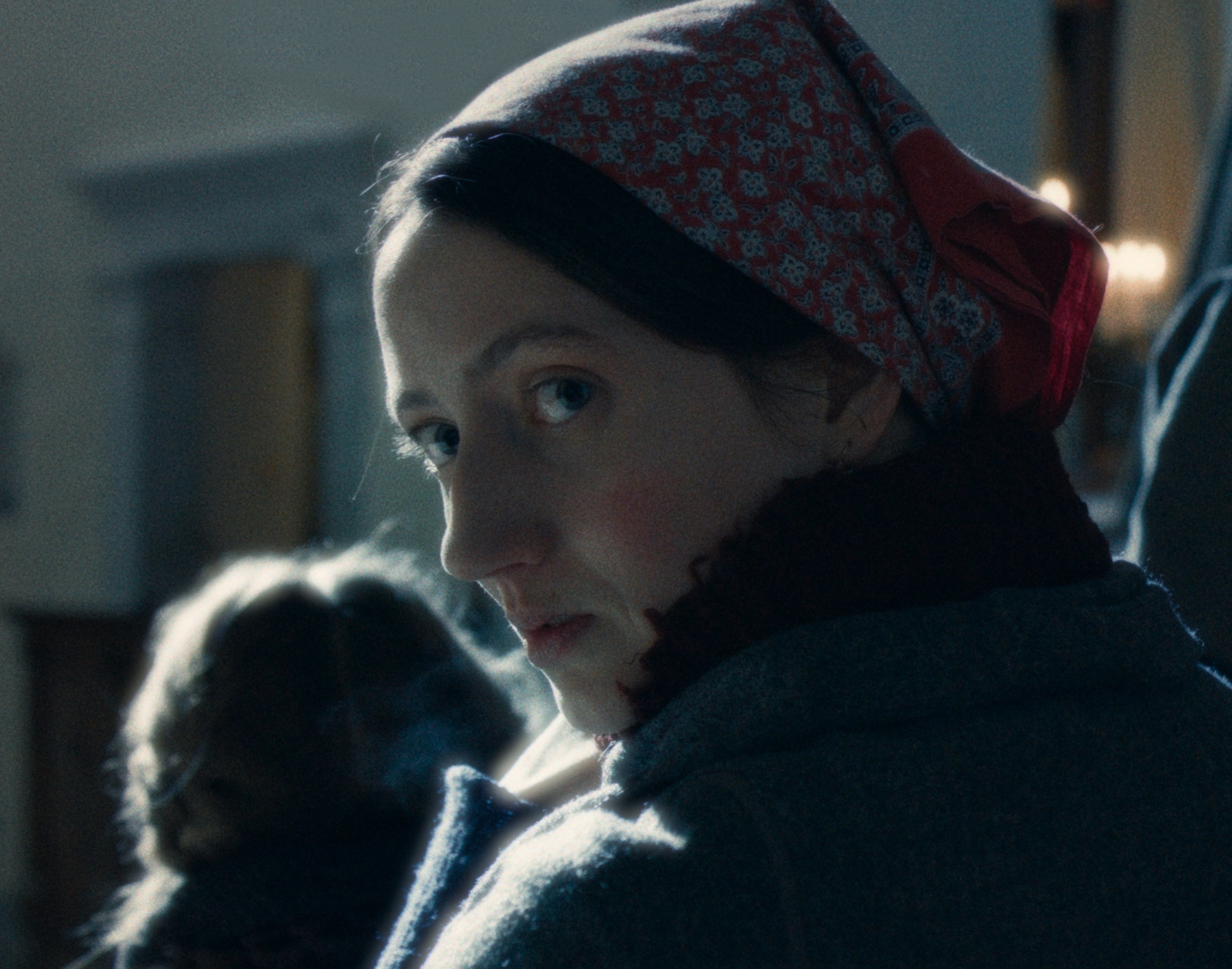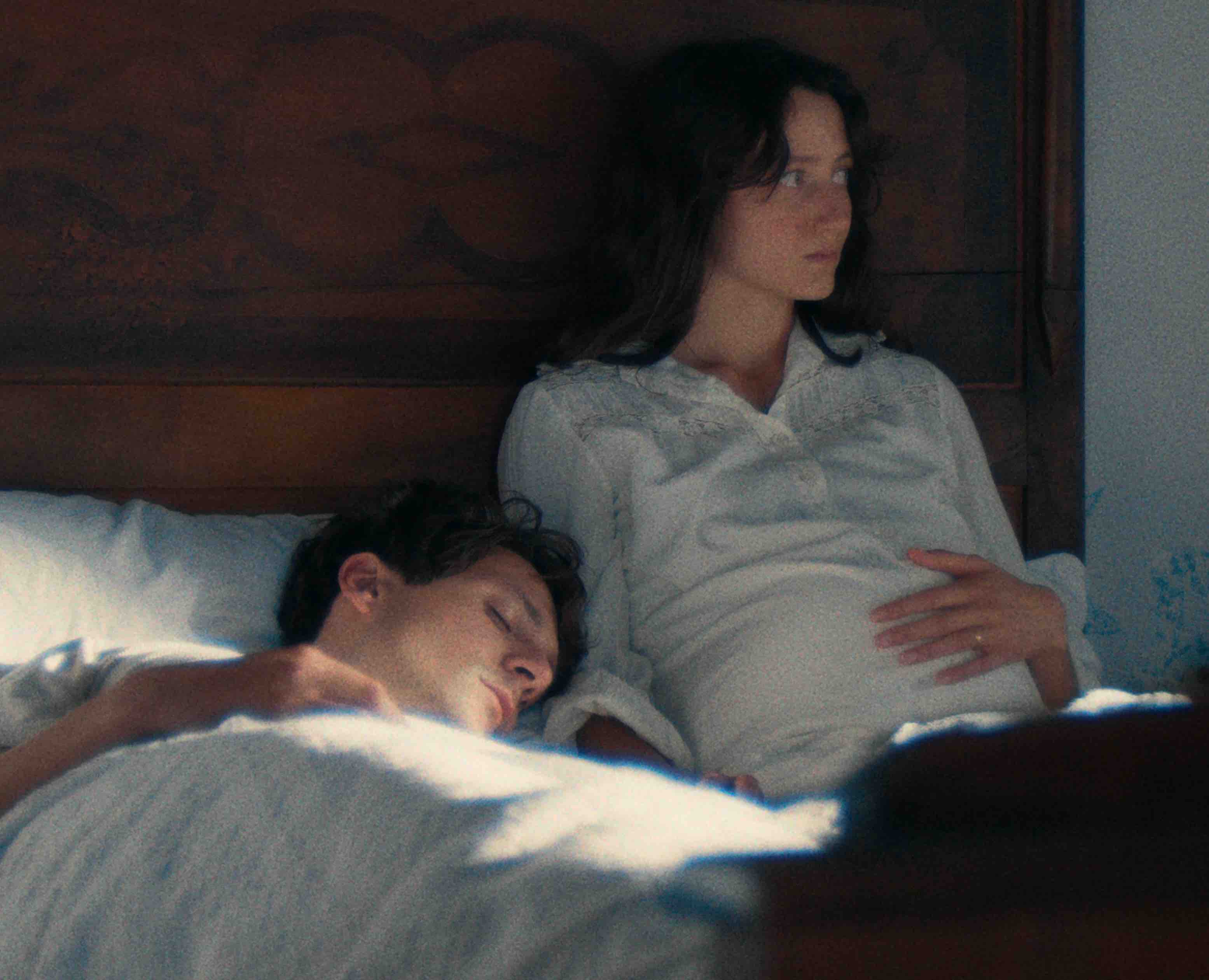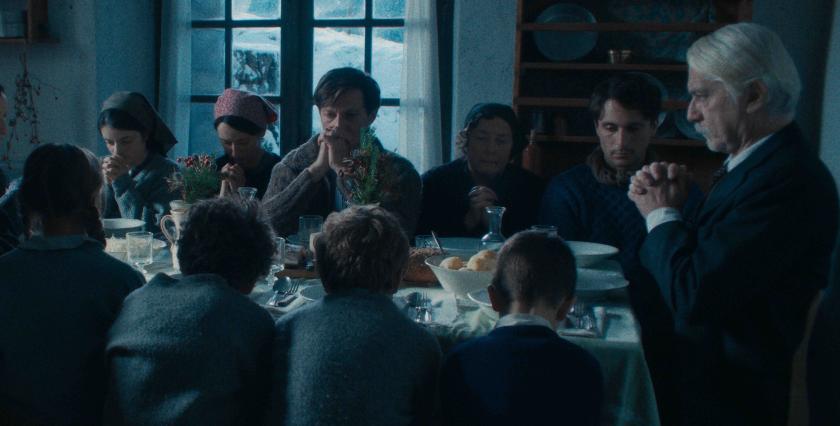Another new release opens with the sounds of people in bed playing over the credits, but these are not Babygirl’s sighs of a woman faking sex but the angelic breathing of three young sisters sharing a bed in the snowy Alto Adige.
It’s 1944, and Italy’s conscripts are starting to desert. Two such arrive in a mountain village in the Vermiglio comune: local man Attilio, who is borne there on the back of a Sicilian, Pietro (Giuseppe De Domenico, pictured bottom with Martina Scrinzi). Attilio’s extended family ignore the mutterings of local men who see Pietro as a shameful deserter, a “mummy’s boy” foreigner from down south. “If more men were deserters,” pronounces Attilio’s school teacher uncle, Cesare Graziadei (Tommaso Ragno), gravely, “there would be fewer wars.” His family consign Pietro to sleeping in their cow-barn, but there is a grudging sense that they owe him one for saving Attilio.
The Graziadei family is a respected one, thanks to its paterfamilias’s role as the school teacher. Cesare is a stern, disdainful but relatively cultured type who acts as a moral arbiter locally. He listens to his two shellac recordings of Chopin preludes and smokes non-stop as he stares into the middle distance. HIs one-room school, with children as young as five, up to his oldest boy, sullen teenaged Dino (Patrick Gardner), is a sober place where the little pupils – adorably – start their day by doing calisthenics in their seats.
There’s an air of rural idyll about the place, far from the brutish conflict and ignored now by the Germans. Director Maura Delpero, who is from the area, builds up a portrait of a world that runs its own course, cocooned and conservative, and doesn’t realise it’s on the brink of transition. Pietro is one catalyst of this shift, but the roots of change are already growing as war scrambles the world’s politics and economics.
Behind the family’s calm, industrious facade, secrets are locked away. Ada, the second eldest daughter (Rachele Potrich), assigns herself punishments for her self-diagnosed sins. These vary from standing praying in a corner, hidden by an open wardrobe door, to lying in chicken shit in the henhouse. An egregious sin sees her fulfilling her promise to her younger sister Flavia (Anna Thaler) that her next penance will be a whopper: making herself eat the chickens’ droppings. She secretly smokes, too, and truffles out others’ secrets, such as her father’s cache of photographs of nude women and her elder sister Lucia’s growing fondness for Pietro.
Wide-eyed, unworldly Lucia (Martina Scrinzi, pictured right) will hide her consequent pregnancy, until her mother wordlessly acknowledges it as she is measuring her for her wedding dress. It’s the kind of scene the film executes with admirable simplicity, conveying its important plot point without a word being spoken, just eyes meaningfully meeting other eyes. Pietro, Attilio confirms, is a mostly silent man, though there isn’t much talking in wars, he notes mordantly. And anyway, Pietro doesn’t speak the local Ladino. The only time his voice sparks into life is when he describes witnessing the cruel practice of the army’s decimation day – killing every tenth soldier as a warning against desertion. When his friend Ciro was needlessly killed next to him like this, he realised he had to escape.
Lucia (Martina Scrinzi, pictured right) will hide her consequent pregnancy, until her mother wordlessly acknowledges it as she is measuring her for her wedding dress. It’s the kind of scene the film executes with admirable simplicity, conveying its important plot point without a word being spoken, just eyes meaningfully meeting other eyes. Pietro, Attilio confirms, is a mostly silent man, though there isn’t much talking in wars, he notes mordantly. And anyway, Pietro doesn’t speak the local Ladino. The only time his voice sparks into life is when he describes witnessing the cruel practice of the army’s decimation day – killing every tenth soldier as a warning against desertion. When his friend Ciro was needlessly killed next to him like this, he realised he had to escape.
Dialogue is sparse in Maura Delpero's film, too. Instead, she employs a symphony of natural found-sounds – crunching snow, wind, birdsong, cowbells, milk sploshing into buckets – that draw us into the everyday rural life of the characters. Cesare’s Chopin is literally from another kind of world, one of intense romantic love and creativity. These two worlds, the natural and the artistic, meet when he plays his new recording, Vivaldi’s Four Seasons, to his class and analyses for them the way the composer uses music to mimic the sounds of the birds. They look on bemused.
The push-pull between the academic and the rural extends in a broader sense to the family, who can’t afford to send more than one child at a time to a school in Trento. The chosen one is Flavia, who flatters her father by being just like him, sharp-witted, a voracious reader. Ada has to be content with ending her learning as Flavia progresses, reluctantly resigning herself to being a girl with high marks in domestic science. Lucia has missed out altogether because of the war. Meanwhile, Cesare’s wife has to watch as he buys an expensive new record while she is counting out rations of potatoes for her growing brood of children.  The end of hostilities is a pivot of a bigger kind, as the country’s towns start to suck up the unemployed poor from rural areas. The beauty of the Alto Adige is not a means to a living, we see, even though its slow pastoral ways might seem attractive to jaundiced urbanites and its communal rituals, like the close harmony singing of its menfolk, are a joy. Lucia’s family starts to splinter, and her father leads a dwindling band of children on walks in the forest.
The end of hostilities is a pivot of a bigger kind, as the country’s towns start to suck up the unemployed poor from rural areas. The beauty of the Alto Adige is not a means to a living, we see, even though its slow pastoral ways might seem attractive to jaundiced urbanites and its communal rituals, like the close harmony singing of its menfolk, are a joy. Lucia’s family starts to splinter, and her father leads a dwindling band of children on walks in the forest.
This is a gentle piece of work, blessed with naturally talented young actors, notably the little Graziadei brother Pietrin (Enrico Panizza), whose naive questions, posed in his cracked young voice, project his honesty and unworldliness. It leaves you sad for a world clinging on to its traditions, however outlandish. But the cabbage leaves tied by an old lady round a sick baby’s head will not save him, nor the festival of Santa Lucia guard the villagers from unhappiness.
The choice of this saint is not random, presumably. Lucia has regularly been cast as St Lucia at the area’s annual festival in her honour, taken on a donkey through a crowd of torch-bearing locals, who pray for her beneficence. Lucia is playing the saint of clear sightedness, but it’s a gift she herself sadly is not blessed with. St Lucia also helped save Christians from the Romans, just as the 20th century village her namesake lives in has helped protect Pietro from the Germans. But Pietro unexpectedly drags the village into the “foreign” ways of the south, where a fiercely protected code of honour overrides the villagers’ more generous, communal instincts.
The film leaves you sensing you are watching people with a profound attachment to their world, but it does this without a shred of sentimentality or editorialising emotionalism. The simplicity of its storytelling is a treat to watch.















Add comment